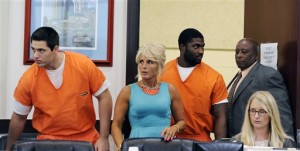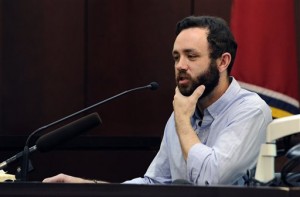
Former Vanderbilt football players Brandon Vandenburg, left, and Cory Batey, second from right, appear in court Monday, June 15, 2015, in Nashville, Tenn. Defense attorneys for the two former Vanderbilt football players convicted in the dorm-room rape of a student asked a judge Monday to declare a mistrial, saying a juror intentionally withheld information that he was a rape victim during the jury selection process. (Shelley Mays/The Tennessean via AP)
NASHVILLE, Tenn. (AP) — A judge has granted a mistrial in the case of two former Vanderbilt football players convicted in the dorm-room rape of a student.
Criminal Court Judge Monte Watkins on Tuesday ruled in favor of defense attorneys who said a juror intentionally withheld information that he was a rape victim during the jury selection process.
Defense attorneys said the juror, 31-year-old Todd Easter, intentionally withheld information that he was a rape victim during the jury selection.
Easter testified at a hearing last week that he didn’t withhold information because he doesn’t consider himself a victim.
In his ruling, Watkins said “actual bias has been clearly shown.”
“Our system of justice cannot tolerate a trial with a tainted juror regardless of the strength of the evidence against the defendant,” Watkins said.

In this June 15, 2015, file photo, Juror Todd Easter testifies in court during a hearing in a case involving two former Vanderbilt football players in Nashville, Tenn. Criminal Court Judge Monte Watkins granted a mistrial in the case of two former Vanderbilt football players convicted in the dorm-room rape of a student on Tuesday, June 23, 2015, when he ruled in favor of defense attorneys who said a Easter intentionally withheld information that he was a rape victim during the jury selection process. (Shelley Mays/The Tennessean via AP, File)
A Sumner County man was convicted of raping Easter when he was 16. However, Easter testified that his relationship with the man was consensual and that his parents were the ones who pressed charges.
The Associated Press generally does not identify victims of alleged sexual crimes, but Easter, who was the jury foreman, agreed to have his name included in news stories.
Defense attorneys described Easter as “deceitful and manipulative,” and that he had an agenda.
They said that during the jury selection process Easter had a chance to discuss the rape case he was involved in but when asked whether he had been sexually assaulted, defense attorneys said Easter’s response was, “no one super close to me.”
They also noted comments Easter made to the media after the players were convicted, that part of his motivation for wanting to be foreman was so he could look the defendants in their eyes as the verdict was read.
Easter testified that wasn’t his motivation, but that he was simply trying to “give them the respect of a human being.”
Easter acknowledged that he had a sometimes abusive relationship with the man who was convicted of raping him. He said the two engaged in sexual activity more than 100 times, and that the man — who was seven years older than Easter — threatened to harm him when he broke off the four-month relationship.
Authorities said Easter went to his mother out of concern and she and her husband contacted authorities.
Easter testified that he was against his parents pressing charges and that he even met with the man again after he was charged.

